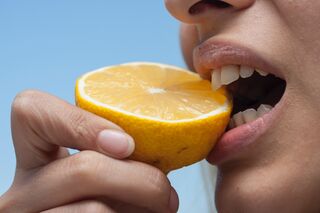Introversion
The Lemon Test: Introverts Are More Aroused Than Extroverts
How you respond to lemons may help explain why you feel shy in social groups.
Posted August 31, 2021 Reviewed by Abigail Fagan
Key points
- The amount of saliva produced from placing a few drops of lemon juice on the tongue can reveal one's level of introversion.
- The Reticular Activating System (RAS) is a brain system that responds to stimuli like food or social contact.
- Because introverts experience higher levels of RAS cortical arousal to begin with, even a little arousal may leave them feeling overstimulated.

Back in the 1960s, personality psychologist Hans Eysenck and others theorized that introverts produce more saliva than extroverts due to natural differences in the biology of nervous systems. The key idea was that introverts are characterized by a state of higher cortical arousal which increases wakefulness, vigilance, muscle tone, and heart rate. Consequently, they really do not need much stimulation to push them beyond the threshold of relaxation and into the realm of anxiety and overstimulation. Extroverts, however, have a lower starting point for arousal and therefore need more stimulation to get to the same point.
The amount of saliva you produce after placing several drops of lemon juice on your tongue might reveal just how introverted you are.
Why Do Introverts Produce More Saliva?
It has to do with a part of your brain called the Reticular Activating System (RAS) which responds to stimuli like food, or social contact. For example, it controls the amount of saliva you produce in response to food. Similarly, if your RAS is set on high as its starting point, even a minimal amount of social contact can seem unmanageable. Extroverts, on the other hand, have a lower starting point and enjoy seeking out an abundance of social interactions to get them up to a point where they feel normal and satisfied.
Lemon juice provides the perfect food stimulus to test this. For many of us, squeezing fresh lemon juice on your tongue makes your mouth water, and it does so because your RAS is responding to the incoming lemon juice.
Scientists believe that introverts have increased activity in their RAS and therefore increased production of saliva from tasting the lemon. And because the RAS also reacts to social contact, introverts react more strongly to meeting people too. In contrast, extroverts require a much larger stimulus to generate a response. So they usually produce less saliva in response to lemon juice than introverts, but are more comfortable in social groups.
Take the Test Yourself
Try this simple test with friends and family and compare your results.
Hold half a lemon on your tongue for about 20 seconds. Then without swallowing, close your mouth for two seconds. What do you notice? Excessive saliva? Or the usual amount?
Compare Yourself with a Friend
You will need: Lemon juice, a kitchen scale, some cotton balls
- Hold half a lemon on your tongue for 20 seconds. Then without swallowing, close your mouth for two seconds. Put the cotton ball in your mouth and close your mouth for 10 seconds.
- Use the cotton balls to mop up all the saliva that you produce. When you’ve mopped it all up, put the cotton ball on your kitchen scale to measure the weight.
- Compare your results with your friends and family, and see whose weighs the most. I expect you will find that introverts produce a lot of saliva in response to lemon juice relative to that produced by extroverts.
In previous tests, introverts produced about 50 percent more saliva than extroverts and this was true for men and women. But it is worth bearing in mind that there are lots of other factors that affect saliva production, such as time of day and how thirsty you are. Also, these effects are most powerful when pure fresh lemon juice is used, as opposed to watered down juice or other less intense liquids.
©2021 Kevin Bennett Ph.D. All rights reserved.
References
Corcoran, D. W. J. (1964). The relation between introversion and salivation. The American Journal of Psychology, 77, 298-300.
Eysenck, H. J. (1963). The biological basis of personality. Nature, 199, 1031-1034.
Vorbach, L., & Bennett, K. (2020). Cortisol affords immediate action and alertness. In Shackelford, T.K., & Weekes‐Shackelford, V.A. (Eds.), Encyclopedia of Evolutionary Psychological Science. Springer, Cham. https://doi.org/10.1007/978-3-319-16999-6_1152-1
Vorbach, L., & Bennett, K. (2020). Stress and cortisol. In Shackelford, T.K., & Weekes‐Shackelford, V.A. (Eds.), Encyclopedia of Evolutionary Psychological Science. Springer, Cham. https://doi.org/10.1007/978-3-319-16999-6_1151-1


